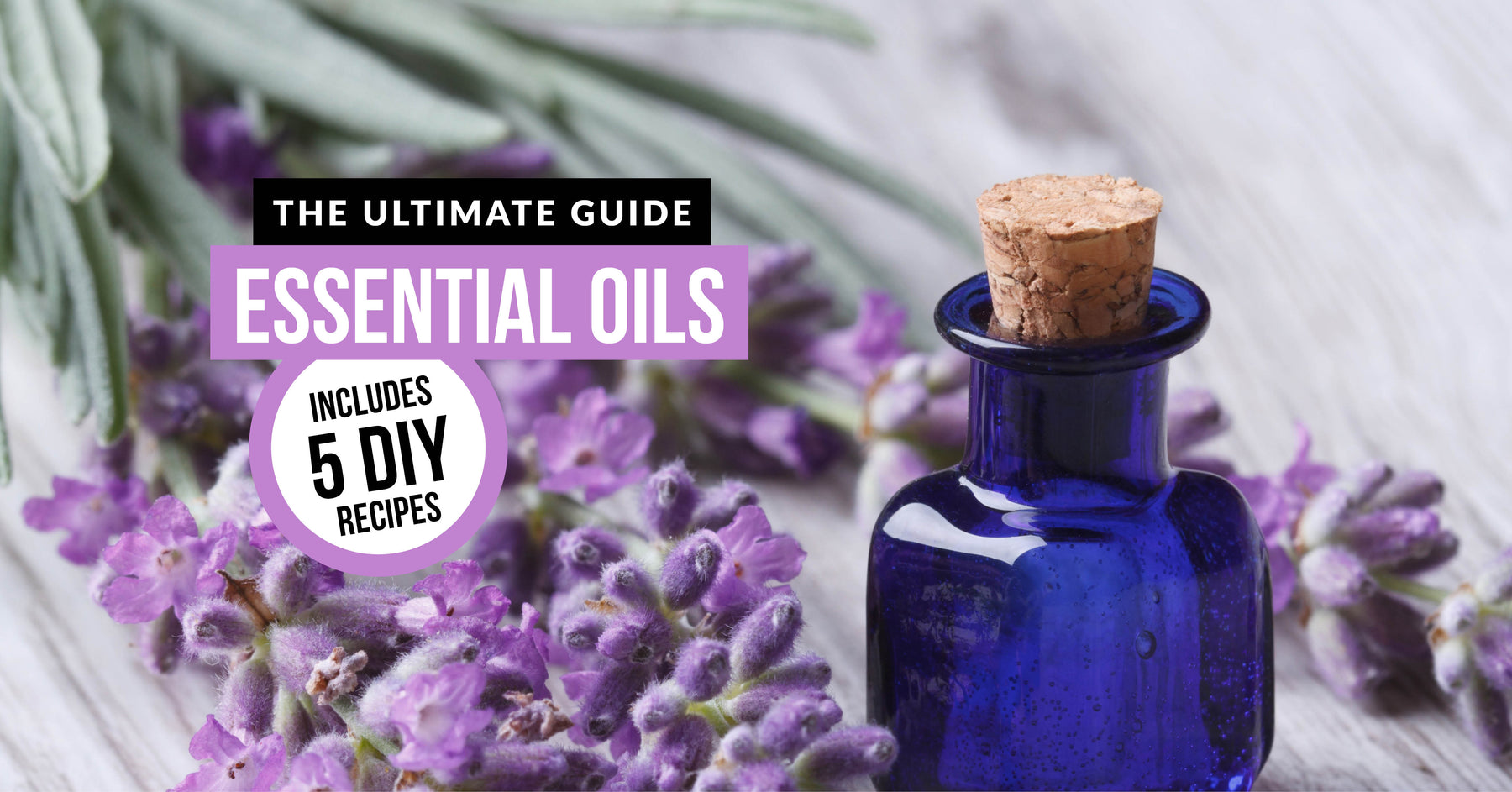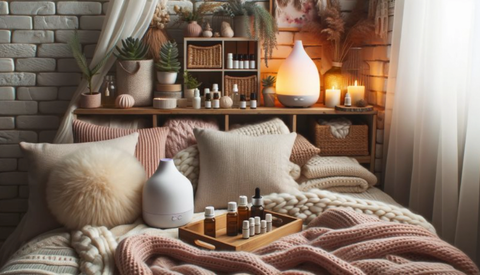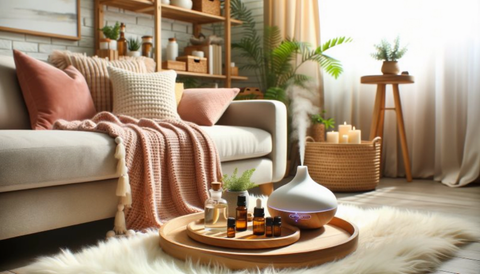
Loading..
My Store
Hours of Operation
Find your nearest store
Results
Loading...

With so many options to choose from where do you start?
We all know essential oils smell amazing but did you know there is some exciting research linking these oils to real health benefits!
This guide to essential oils aims to empower you with information and provide clarity on which essential oils are best suited for your needs. See all of our essential oils here. Already know what you are looking for? Take advantage of our first order discount when signing up for our weekly newsletters.

Lavender oil has been around for centuries. It’s said that the name comes from the Latin word “lavare”, which means “to wash”, or from the word “livendulo”, which means “livid or bluish”. It’s been used all over the world for a number of different uses and is certainly one of the most popular essential oils today.
Although one of the most calming essential oils, lavender has a number of different effects. In ancient Egypt, it was often used for embalming and cosmetic purposes. In ancient Rome, lavender was touted for its healing and antiseptic properties, and in the middle ages, it was used throughout England to make furniture polish and to help make clean clothes smell good (we still have lavender scented laundry detergent today!)[i]
Interesting fact! When the tomb of King Tut was opened, there were jars found that contained materials resembling lavender. This is a callback to the use it as an embalming property in the ancient world.[ii]
There have been several studies done with lavender oil to prove its effectiveness when dealing with mental health issues. A Health Canada study in 2012 found that approximately 2.6% of Canadians aged 15 or older reported symptoms of an anxiety disorder. Natural solutions should be the first step toward treating this common affliction. Several clinical trials demonstrated that oral use of lavender oil can help reduce symptoms of generalized anxiety disorder (GAD). The effects were similar to common groups of pharmaceutical drugs prescribed to treat symptoms of GAD, without their unpleasant side effects.
Chamomile has been used therapeutically throughout history, and as early as the 1st century CE for digestive complaints. Like lavender, its uses varied across different areas of the world, but some of its main uses include cosmetically and to calm a variety of different ailments. It’s a very gentle oil that is even great for use with children.
There are two main types of chamomile: Roman and German. Roman chamomile is native to Western Europe and northern Africa but is now harvested worldwide in different temperate regions. German chamomile is native to Europe and northwest Asia and still grows wild there today.
Interesting facts! A book publishing in 1911 called Herb Garden claims that chamomile has a remarkable effect on other plants to keep them vibrant and lively, and it’s actually been called the “plant’s physician”. If it can keep plants healthy, imagine what it can do for you!
One controlled, randomized clinical trial looked at people who took chamomile capsules to help treat anxiety. The study showed that the treatment helped reduce anxiety symptoms in people with mild to moderate generalized anxiety disorders. [iii]
Ylang ylang has a long history of use, but its medicinal properties weren’t recognized until the beginning of the 20th century when it was used to treat a variety of diseases like malaria, typhus, and intestinal distress. Interestingly, it was also noticed to have a positive effect on the heart in times of distress – perhaps the first indication of its calming abilities. [iv]
Ylang ylang comes from the star-shaped flowers of the ylang-ylang tree most commonly found in Malaysia and other areas of East Asia and, today, Madagascar. The quality of ylang-ylang essential oils depends on when and how the flowers of the tree are harvested.
Interesting fact! The ylang-ylang tree doesn’t produce flowers until its fifth year of growth, but once it does, it makes around 45 pounds of flowers per year and can produce flowers for us to 50 years.
Frankincense has been valued and traded for upwards of 5,000 years and has long been used as part of ceremonies or to scent temples or homes of leaders. It’s long been documented as a “heal-all” oil, used to treat everything from indigestion to coughs and colds to hemorrhoids. Today, we recognize the healing and calming effects of this oil.
Frankincense oil comes from the Boswellia and Commiphora trees. The bark of these trees, when cut, gives off a sap from which hardens and can then be steamed to make the essential oil of frankincense.
Interesting fact! There have been times when frankincense may have been worth more in its weight than gold, but the value of this substance plummeted when the Roman Empire fell and trading routes were cut off.

You’re probably accustomed to using rosemary in your cooking, but what about in your diffuser? It’s been used extensively since ancient times for a variety of purposes, including being used in wedding ceremonies and medicinal herbal care.
Paracelsus, a renowned German-Swiss physician, and botanist in the 16th century, promoted rosemary oil and its ability to strengthen the entire body, and he specifically touted it for its effects on the liver, brain, and heart – which he was right about. [v]
Interesting fact! Rosemary is derived from the leaves of a plant, and in aromatherapy, the leaves are said to be the lungs of the plant, helping deliver oxygen to the plant and strengthen it. In short, it provides it with life.
Cedarwood oil is derived from a tree that is native to North America and can age up to 1000 years. In ancient Egypt, this oil was used in the mummification process, to repel insects, and in cosmetics.
Not only is cedarwood essential oil beneficial for focus and a calm energy, but in the last 100 years, its positive effects on skin problems like eczema has widely been noted.
Interesting fact! Cedarwood oil is steam-distilled from the wood of the tree and actually looks like a yellowy balsamic syrup. It has a warm, woodsy aroma.
Patchouli oil comes from a perennial herb that grows in Southeast Asia at elevations between 3,000 and 6,000 feet. It was first used as a moth repellant and so was often used in the production of clothing.
Patchouli oil is one of the few that improve with age – an older one is more desirable than a newer one. It’s considered to be a great balancer and helps bring about a relaxed energy and a calm focus that help many people improve focus and attention.
Interesting fact! Over time, patchouli oil loses a harsh smell that many people don’t like about patchouli, and instead develops a sweeter scent. The oils also turn from a light yellow to a deep amber as it ages.
Because the eucalyptus tree had so many beneficial properties, it was believed the oil of the tree might prove antiseptic. The oil was first distilled in the late 1700s to help reduce chest colds, and many more uses for eucalyptus oil were discovered in the years to follow
There are over 300 species and 700 varieties of eucalyptus and the trees have extensive root systems that absorb a huge amount of water, which led to its use of being planted in marshy, malaria-infested areas to try to dry up and purify the soil and air.
Interesting fact! The eucalyptus tree is one of the fastest growing trees in the world, reaching heights up to 480 feet. The oil has a long history of use, including being used during World War I to control meningitis and a flu outbreak.

Grapefruit, while originally from Asia, is now harvested in areas like the United States and Brazil. The fruit comes from a glossy-leaved tree that grows to about 10 meters in height.
The oil from the grapefruit is derived from the glands embedded deep within the peel of the fruit which yields a small amount of oil when cold pressed. The essential oil has a sharp refreshing smell and is usually either a pale yellow or light ruby colour.
Interesting fact! Grapefruit essential oil is part of the citrus oil family, and as such, should be used within 6 months of purchase.
This oil comes from the lemon verbena plant which was originally native to South America but was introduced in the 17th century to Europe. By the 18th century, it spread to the Mediterranean and North American regions.
The lemon verbena plant has a thin stem and long, pale green leaves which undergo steam distillation to extract the oil. Lemon verbena oil has a fresh, lemony, sweet scent and a pale olive or yellow in colour.
Interesting fact! Pure lemon verbena essential oil is sometimes hard to find, as most often retailers offer lemongrass oil or lemon balm oil, which are not quite the same as the pure lemon verbena oil.[vii]
The bergamot tree has an evergreen origin and is believed to be a cross between a sweet orange tree and a type of citrus tree. Its place of origin is debated, from Southeast Asia to Europe to Greece, but the oil has long been used as a pick-me-up when people are plagued with tension, stress, or low moods.
This oil comes from the peel of the fruit of the bergamot tree when the fruit is cold pressed. Because of its citrus but spicy aroma, it’s often used in perfumes and other cosmetic applications.
Interesting fact! One of the most popular uses of bergamot is in black tea, which blends together well to create the popular and well-loved Earl Grey tea.
Orange essential oil has perhaps one of the widest range of uses for an essential oil, including to add flavor to foods, use in cosmetic and beauty products, as a room freshener or deodorant, and much more. For aromatherapy, though, it has long been touted as an invigorating scent with anti-depressant properties.
The oil is cold pressed from the peels of the oranges, similar to other citrus oils.
Interesting fact! Orange essential oil has a unique property of promoting secretion from a number of your glands, and so has historically been used to help promote things like menstruation, lactation, and flow of digestive juices or bile.
Now that we know what some of the different essential oils are used for, how do we actually use them? Essential oils have a number of different uses and purposes but for the therapeutic benefits we mentioned above, the best way to take advantage of all they have to offer is through aromatherapy. In today’s world, this is easier than ever with the production of essential oils diffusers that allow you to enjoy the benefits and pleasantries of aromatherapy in an easy and convenient way.
When it comes to diffusers, there are two main types: heat and vapor. If you’re new to the essential oil world, or just want to consider your options, it’s important to know the pros and cons of both kinds of diffusers so that you can make the right choice for you.

Let’s look first at heat diffusers. These are often the cheaper option when it comes to diffusers. They have the added benefit of being completely silent in a room so you don’t even notice when it’s working away at your oils. Not all heat diffusers are made the same, but the best ones will produce very low levels of heat and more subtle aromas. However, some heat diffusers use high levels of heat to produce stronger smells, but this can alter the chemical constituents of the oil. All heat diffusers have one major drawback: they share the potential of fractioning the oil into its different components because of the application of heat. This means that the whole oil won’t get into the air, and since the oil becomes divided or broken down, you won’t get the same therapeutic effects of that oil, which essentially negates the purpose of diffusing the essential oil for aromatherapy. However, they do still diffuse the oils for a pleasant smell in the room.
Vapor diffusers, on the other hand, use no heat whatsoever. Instead, they use jets of air to pull the oils from the bottom to the top of a tube and dispels them in a fine mist or spray. This type of diffusion allows the whole oil to be dispersed into the air in the form of tiny droplets. The oil is not split at all or broken down into different constituents, meaning you get the whole benefit of the whole oil. In terms of aromatherapy benefits, this is definitely the way to go. They have a bit of a hum to them when they are functioning due to the fact that they are working so powerfully to quickly saturate the air with the essential oil scent and benefits that you desire.
Vapor diffusers have one major obstacle for people: they usually cost more than heat diffusers. However, if you are wanting to enjoy the benefits of aromatherapy and spend the money on getting essential oils, you want to make sure you are using a diffuser that doesn’t harm or split those oils. You want to make sure you have a diffuser that uses the oils to the best of their ability and allows you to get your money’s worth, while at the same time allowing you to enjoy their health benefits and wonderful scents. It’s like buying a new TV: you wouldn’t buy one that looks great but lacks a picture or has no ability to produce sound. If you’re going to enjoy essential oils, make sure you get the right equipment in place.
When you’re using diffusers, dilute the oil you want in some water and simply turn the diffuser on – that’s it! You can blend together different oils to create a pleasing scent, though we would recommend making sure you mix oils from the same therapeutic benefit groups. For example, don’t mix a calming oil with an energizing one if you are hoping to get relaxation out of the aromatherapy. There are lots of great blends you can make online with individual oils, and also lots of pre-made blends in store or online here!

You can use essential oils for more than just aromatherapy. They are perfect for creating homemade cleaning recipes with as an all-natural alternative to cleaning products without any of the chemicals or bad ingredients that are normally in these products. In fact, many essential oils are naturally antiseptic and anti-bacterial, making them perfect for cleaning your home. Plus, they smell amazing! Beyond that, you can use them to create amazing body care products to nourish your skin. We have two great recipes that will help revitalize your skin and your mood: a body scrub and an Epsom salts bath. Try one or both of them today and let us know how you feel!

Blend the vinegar and water together and slowly add to the baking soda. It will fizz. Add the essential oils, and stir to blend. Use anywhere you would regular all-purpose cleaner.
Add 2 tbsp. scent free castile soap to your water, and 4-5 drops of these bacterial-bursting essential oils.

Blend the sugar and avocado oil. Add the sweet orange essential oil 1 drop at a time. Zest about 1/2 the orange and add to the mixture. Apply this scrub in the shower, as it is a bit messy.[x]
All ingredients can be found at Goodness Me!
All ingredients can be found at Goodness Me!
Run a warm bath at the desired temperature. Add Epsom Salts to your bath slowly and gently mix in with your hand. Add essential oil drops. Light some beeswax candles, dim the lights, create a relaxing atmosphere for yourself, and enjoy! This bath treatment is the perfect escape from the chilly outdoor air and will take you away to a place of peace and relaxation - right in your own home. The use of Epsom Salts will draw out impurities in your skin and leave your mind and body feeling refreshed!
Essential Oils are potent by nature. It is not safe to directly consume these plant extracts as a general rule. Some oils like peppermint can be safe if diluted while other oils can wreak havoc through your intestines. Before consuming any essential oil be sure to consult with a naturopathic doctor. They may be able to suggest specific products designed for ingestion.
Essential oils are best used when diluted into a carrier oil. These carrier oils make it safer for you to come in direct contact with the oils through bath solutions, topical creams, for prolonged use. Since the vapors tend to dissipate quickly, the carrier oils help to keep the sent active. Try blending essential oils with these carrier oils: Sweet almond oil, Avocado oil or grapeseed oil.
[i] http://kitchenproject.com/history/Herbs/Lavender/
[ii] http://kitchenproject.com/history/Herbs/Lavender/
[iii] Amsterdam JD, Yimei L, Soeller I, et al. A randomized, double-blind, placebo-controlled trial of oral Matricaria recutita (chamomile) extract therapy for generalized anxiety disorder. J Clin Psychopharmacol. 2009;29(4):378-382.
[iv] https://www.ncbi.nlm.nih.gov/pubmed/16807875
[v] https://www.organicfacts.net/health-benefits/essential-oils/health-benefits-of-rosemary-oil.html
[vi] Kumar A, et al. Antibacterial properties of some Eucalyptus oils.Fitoterapia. 1988;59:141-144.
Osawa K, Yasuda H, Morita H, Takeya K, Itokawa H. Macrocarpals H, I, and J from the Leaves of Eucalyptus globulus. J Nat Prod. 1996;59:823-827.
[vii] https://www.ncbi.nlm.nih.gov/pmc/articles/PMC5781260/
[viii] http://essentialoilsinformer.com/10-astonishing-benefits-and-uses-of-lemon-verbena-essential-2/
[ix] https://www.ncbi.nlm.nih.gov/pmc/articles/PMC3732892/
[x] Recipe by: Colleen Hague, co-owner and founder of Awaken My Senses Inc.
Studies
{"one"=>"Select 2 or 3 items to compare", "other"=>"{{ count }} of 3 items selected"}
Comments
Leave a comment